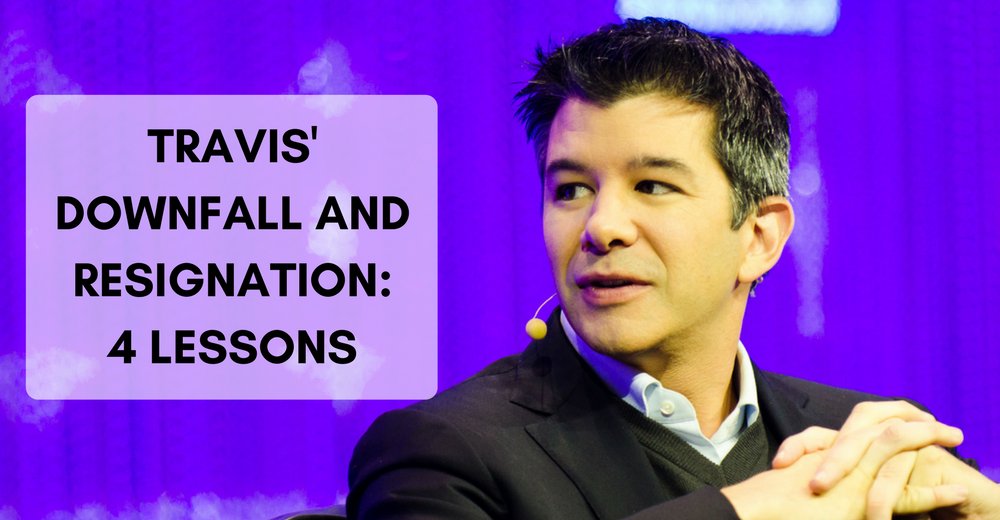The internet has been buzzing with news of Travis Kalanick’s resignation from Uber. You can read a quick summary of the events that led to his stepping down here.
However, his ousting seemed almost inevitable, following a series of controversies, investigations and questionable business practices that came to light this year.
Uber’s name and brand has become almost synonymous with innovation and disruption, before its CEO’s fall from grace shed light on its more unsavoury side.
Once valued around USD70 billion, its valuation has dropped to around USD50 billion, and it will be interesting to see how the company fares without Travis at the helm.
However, before Uber begins its new chapter, here are some key learnings we got from the start of this entire fiasco that culminated to Travis’ resignation.
1. Sometimes it just takes one catalyst to turn the tide against you.
Uber’s toxic workplace and culture was first brought to light by a blog post by Susan Fowler, one of their ex-engineers. It sparked outrage and a lot of negative public attention that was already focused on Travis for being on Donald Trump’s economic advisory committee.
This was actually a major link in a chain of events—some out of Travis’ hands and others self-inflicted—that would lead to his resignation.
Analysts agree that even if Susan hadn’t spoken out, Travis’ continued pattern of behaviour and actions would have eventually led to this same outcome.
2. Just because certain methods worked in the past doesn’t mean they’d be effective forever.
Travis was certainly an effective leader for Uber in its early days. You can’t look at their expansion and growth without seeing that his leadership was obviously taking them where they wanted to go.
However, as stated by a former Uber employee, “By focusing on being the dominant force everywhere, he failed to address his own shortcomings and that ultimately led to his downfall.”
The former Uber CEO led his company to flout transportation and safety regulations, capitalised on legal loopholes and gray areas to gain business advantages and push the line. This drove Uber to where it is today, but also got him into trouble.
Back in 2015, he had an encounter with Tim Cook of Apple because of such business practices, which led to an ultimatum from Tim: stop Uber’s privacy violations or be removed from the Apple App Store.
Based on Uber’s reported privacy infringements since then, they continued down that track despite the clash with Apple.
3. When you’re in a position of influence, your every move is watched, scrutinised and analysed.
After Susan’s post hit public attention, people started to scrutinise Travis, both as a leader and in his personal life.
And what came to light did not reflect well on him.
What can be said about Travis? He led Uber exactly as he lived life. Unfortunately for him, that wasn’t acceptable by the standards of today.
He was one of the boys, enjoying life and not having a very good attitude towards women (the notorious Boob-er incident, referring to women-on-demand). That gave rise to a company culture where workers complained of sexism, racism and gender discrimination.
Of course, he had his strengths—passion, determination and commitment to do whatever was necessary.
Some of his employees deeply respect and admire him, and that’s not easily earned just through extravagant parties.
However in the eyes of his investors, his flaws (and the PR disasters they brought) did not outweigh his strengths.
Travis himself realised that he needed to change. In a letter to the company that he sent while taking a leave of absence, he vowed to return as a “2.0” version of himself.
This was a case of too little too late for his investors, who then banded together to pressure him into resigning.
4. He can still bounce back, despite everything.
Travis’ meteoric rise and fall has been compared to another tech leader’s: Mark Zuckerberg of Facebook.
Like Travis, Mark used to be all about “bro culture”. He too had a reputation for treating laws as “guidelines” that could be broken and prioritising growth over everything else, leading to PR disasters and accusations of stealing intellectual property.
However, that’s a far cry from the Mark Zuckerberg of today, who we can argue, has successfully rebranded himself (and Facebook) away from the shady dealings of their earlier days (for example, hiring a PR agency to plant negative stories about Google).
Travis might not be able to make his mark as the CEO of Uber anymore (though some of his former employees are petitioning for his return), but there is still a chance for him to eventually redeem himself.
Everyone’s been wondering what the next major disruptor, or the “next Uber” would be. Perhaps Travis could be the one to bring that to pass, once he’s past these.
Also Read: 7 Highlights Of Our KL-Ultra Singapore Trip That Had Nothing To Do With Ultra
Feature Image Credit: Wikimedia Commons.











